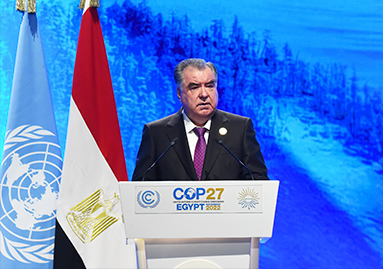 DUSHANBE, 07.11.2022 (NIAT Khovar) –
DUSHANBE, 07.11.2022 (NIAT Khovar) –
Mr. Chairman,
Ladies and Gentlemen!
I at the onset would like to express profound gratitude to the Government of the Arab Republic of Egypt for excellent conditions in organization of today’s Conference.
Unprecedented droughts and floods of this year’s across the many parts of the world and particularly in Central Asia have once again proved that climate change remains one of the most important global challenges.
Tajikistan, with its 93% mountainous territory is vulnerable to climate change.
Natural disasters associated with this process annually because hundreds of millions of dollars of damage to our national economy and in many cases cause loss of life.
It should be pointed out, that the share of Tajikistan in the volume of greenhouse gas emissions is very small and our country is ranked the 130th in global index. Due to the low amount of such emissions, it is ranked among the countries with less effect on climate.
Over 98% of electricity in Tajikistan generated from renewable resources — «green energy», particularly energy we consume is generated in hydropower plants and according to this indicator we are ranked sixth in the world.
Meanwhile, by 2050 we intend to increase our share in the implementation of the “Zero Waste Strategy” through the development of “Green Energy”.
The Government of Tajikistan has adopted the National Climate Change Adaptation Strategy (2030) and a number of other documents.
Dear Mr. Chairman,
Water resources play a key role in the process of adaptation and resilience of the climate change as well as in mitigation of its impacts.
The increase in water-related natural disasters highlights the inextricable link between water resources and climate change. Today, water resources are seriously affected by climate change.
We experience the most obvious example of this development in the rapid melting of glaciers at the global level, including the glaciers of Tajikistan, which forms about 60% of the water resources of Central Asia.
Over the past few decades, out of thirteen (13) thousands of our glaciers one thousand are completely vanished.
Given that Tajikistan’s glaciers and other water sources form 60 percent of Central Asia’s water resources; this process will introduce additional challenges for the countries of the region in terms of their water consumption plans.
In this context, within the framework of the Water and Climate Coalition we proposed to declare 2025 as the International Year of Glaciers’ Protection.
At the same time, as part of our efforts to prepare for the United Nations Water Conference, which will be held in March 2023 under the co-chairmanship of Tajikistan and the Netherlands, we have proposed water and climate linkages as one of the main topics of the Conference.
At the second Dushanbe Conference on Water Decade, we proposed draft Action Agenda in the field of water, which should bring together commitments and actions within the framework of the next year’s Conference.
I do strongly believe that the UN member states and all stakeholders will support us through active participation, solid commitment and acceleration of actions in the implementation of this great responsibility.
I wish all of us successful results from today’s Conference and unity and solidarity on our way towards the next year United Nations Water Conference. I thank you!


